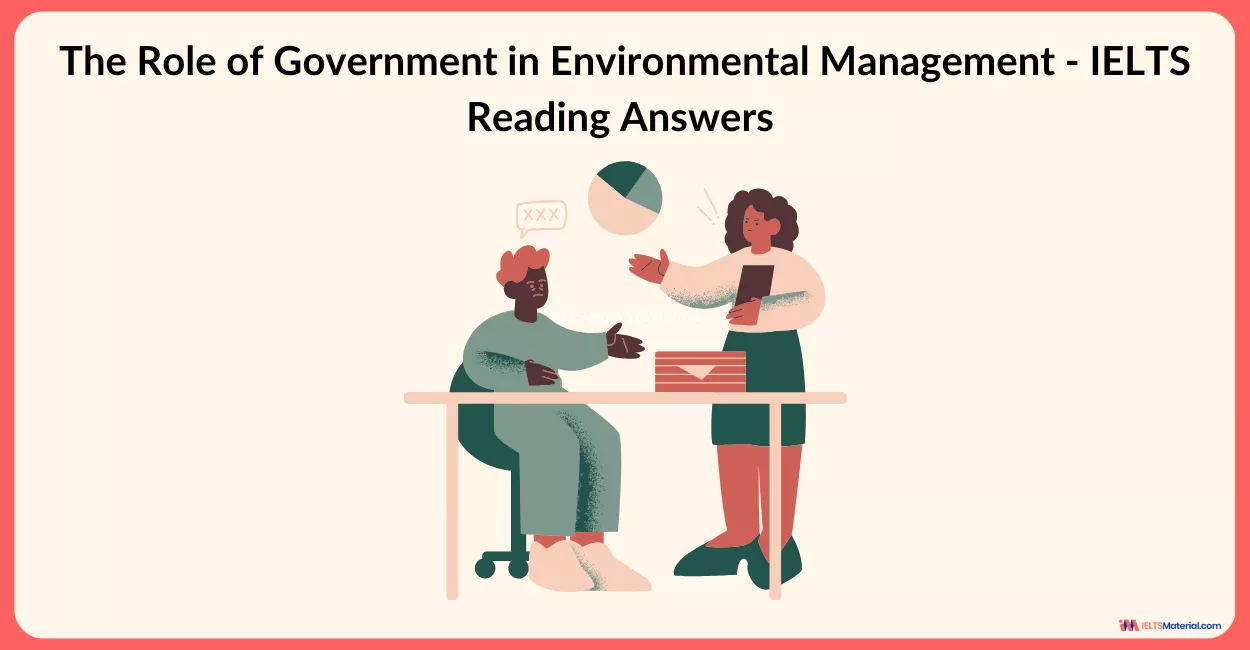IELTS Reading
-
Copy link

Limited-Time Offer : Access a FREE 10-Day IELTS Study Plan!
“ Master the IELTS Reading exam with our comprehensive guide! Familiarize yourself with key aspects, tips, and techniques to achieve your highest reading band score. “
The IELTS Reading test is one component of both the Academic and General Training modules. This 60-minute test evaluates your reading skills through various question types and passages. Here’s an in-depth guide to understanding the IELTS Reading test, including updated facts and preparation tips.
Scoring well in the IELTS Reading section is essential for both IELTS Academic and IELTS General Training candidates looking to achieve their desired IELTS band scores. Understanding the exam format and question types is key to your success. In this blog, we'll guide you through everything you need to know about the IELTS Reading test and share expert tips to help you avoid common pitfalls and excel on exam day!
What is IELTS Reading?
The IELTS Reading test is one of the tricky modules in the IELTS exam. It is different for IELTS Academic and General Training, though the time, question types, and number of questions remain the same. So, look at the table below to get an idea of the IELTS Reading first!
|
Topic |
Details |
|---|---|
|
Purpose of the IELTS Reading Test |
Designed to evaluate your reading skills, requiring you to show your ability to understand and evaluate the provided passages. |
|
Sections and Questions |
Has 3 sections, with a total of 40 questions. |
|
Duration |
60 minutes. It is advised not to spend more than 20 minutes on each passage. |
|
Scoring |
Each of the 40 questions carries 1 point, and there is no negative marking for wrong answers. |
|
IELTS Reading Question Types |
|
Difference Between IELTS Academic & IELTS General
As mentioned above, there are some differences between IELTS Academic Reading and the General Reading module. Read ahead to know more!
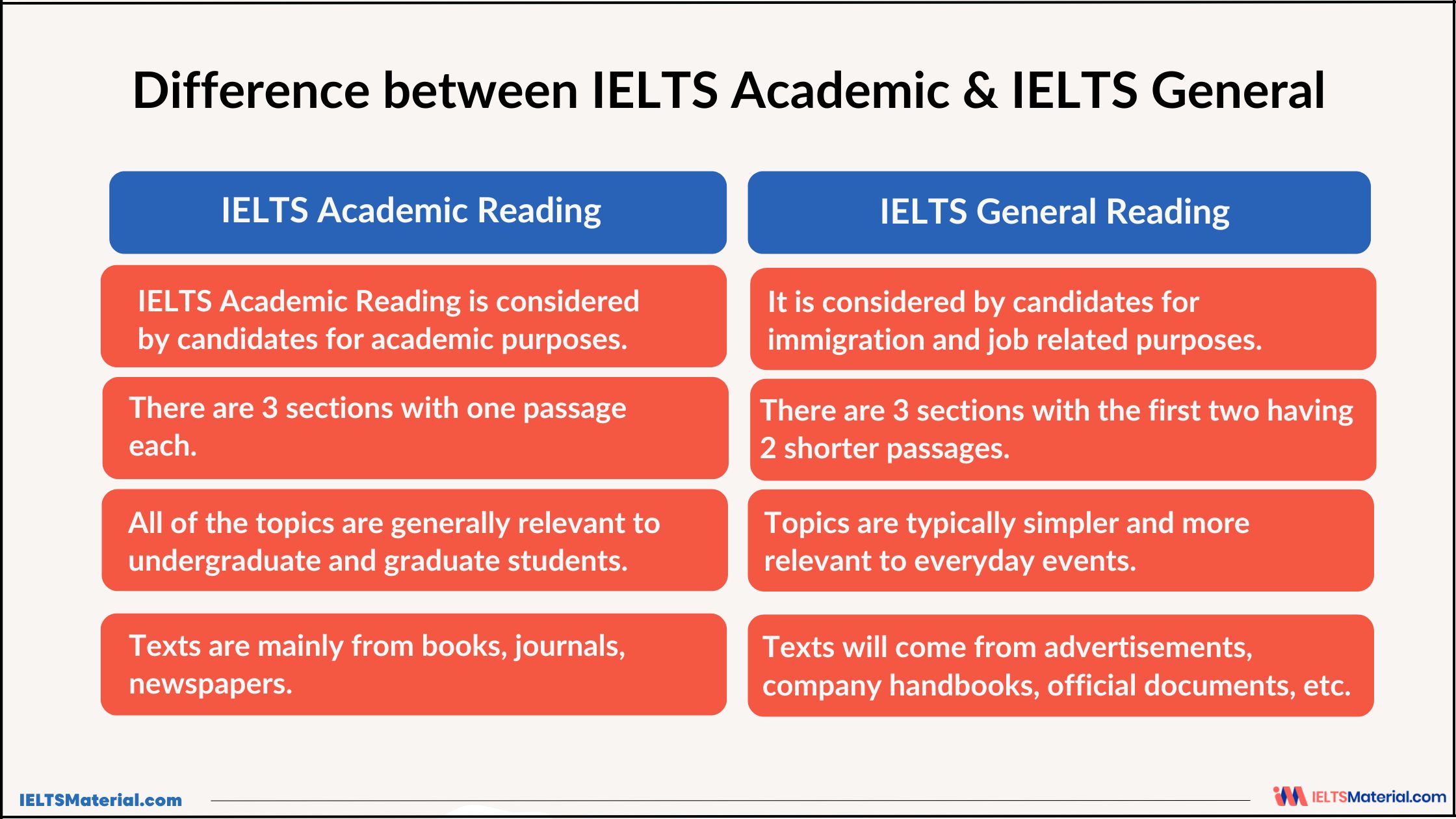
Need personalized guidance for IELTS Reading Practice Tests? Connect with our experts in Online Classes today!
Latest IELTS Reading Practice Tests
Have a look at the following IELTS Academic and IELTS General Reading practice tests and kickstart your practice!
IELTS Reading Practice Tests Academic
IELTS Reading Practice Tests General
Access free practice materials and tips for IELTS Reading. Download now!
IELTS Reading Band Score
The IELTS reading band score is calculated based on the number of correct answers. Since there are a total of 40 questions, answering all of them correctly can help you score Band 9.
Note: There is a slight difference in the calculation of the IELTS Academic reading band score and that of IELTS General Reading due to the slight variation in difficulty level.
Therefore, you can use the IELTS Reading score table given below to calculate your IELTS band score for the Academic and General Reading sections, respectively.
|
Correct Answers for IELTS Reading Academic |
Correct Answers for IELTS Reading GT |
IELTS Reading Band Score |
|---|---|---|
|
40-39 |
40 |
9 |
|
38-37 |
39 |
8.5 |
|
36-35 |
38-37 |
8 |
|
34-33 |
36 |
7.5 |
|
32-30 |
35-34 |
7 |
|
29-27 |
33-32 |
6.5 |
|
26-23 |
31-30 |
6 |
|
22-19 |
29-27 |
5.5 |
|
18-15 |
26-23 |
5 |
|
14-13 |
22-19 |
4.5 |
|
12-10 |
18-15 |
4 |
|
9-8 |
14-12 |
3.5 |
|
7-6 |
11-9 |
3 |
|
5-4 |
8-6 |
2.5 |
How to Complete IELTS Reading in Less than an Hour?
The IELTS Reading section is quite challenging, especially when you have to :
- Read 3 long texts (5 in the General Training exam)
- Answer 40 different questions
- Transfer your answers to the answer sheet accurately
Time management in IELTS Reading is crucial, as you only get 60 minutes to complete the above-listed tasks. So, read our expert IELTS exam preparation tips for reading to complete the module in less than 1 hour!
|
Tip |
Details |
|---|---|
|
1. Learn about the test format |
Familiarize yourself with various texts and questions before test day to enhance your reading skills, helping you manage time and avoid surprises. |
|
2. Learn about different question types |
Understand the 14 different IELTS Reading question types, practice answering them, and manage your time effectively. Read questions first, then passages. |
|
3. Implement skimming and scanning |
Use skimming to read quickly and scanning to locate specific information, which helps find answers faster and more accurately. |
|
4. Use context clues |
Context clues help determine the meaning of unfamiliar words, improving comprehension and aiding in locating answers. |
|
5. Distribute your time appropriately |
Spend 20 minutes on each passage in Academic Reading. In General Reading, allocate more time to the third passage as it is more complex. |
|
6. Build your vocabulary |
Enhance your vocabulary to quickly find the correct answers, as many questions involve understanding synonyms and paraphrasing. |
|
7. Transfer your answers concurrently |
Transfer your answers to the answer sheet right away after completing each passage to save time and avoid last-minute rushing. |
|
8. Read and practice more often |
Regularly practice sample papers and read lengthy texts to improve accuracy, pace, and familiarity with difficult words and phrases. Ensure to study from reliable sources. |
Not sure where to start? Book a free demo session with our IELTS coaches today !
Advanced IELTS Reading Tips and Strategies
Before we move on to the open secret of how to ace the IELTS reading section, let's get introduced to two important keyword techniques and know about Skimming and scanning as well!
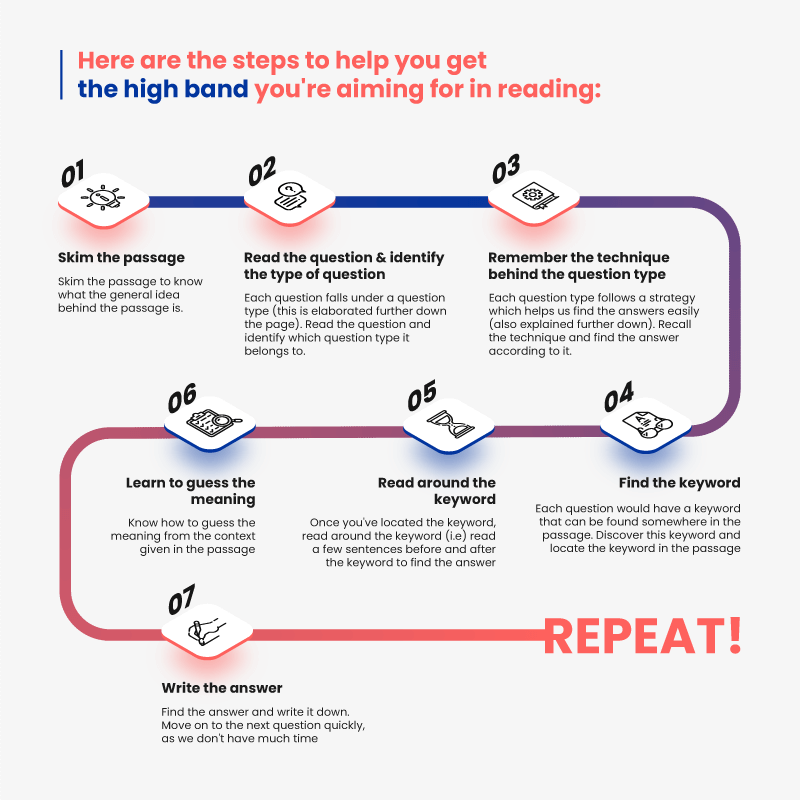
Before moving on to the open secret of how to ace the IELTS reading section, let's introduce two important IELTS Reading keyword techniques.
Skimming & Scanning
- Skimming: This is to read a text rapidly to get a general overview of the material (i.e.) to know the main theme or idea behind the passage.
- Scanning: This is to read a text rapidly to find specific information such as figures, names, etc.
Now, let’s look at a few IELTS Reading tips and steps to help you get your dream band score!
|
Step |
Details |
|---|---|
|
1. Skim the passage |
Skim the passage to understand the general idea. |
|
2. Read the question and identify the type |
Identify the question type after reading it. |
|
3. Remember the technique behind the question type |
Use the strategy specific to the question type to find the answer. |
|
4. Find the keyword |
Locate the keyword in the question and find it in the passage. |
|
5. Read around the keyword |
Read sentences before and after the keyword to find the answer. |
|
6. Learn to guess the meaning |
Use context clues in the passage to infer the meaning. |
|
7. Write the answer |
Write down the answer and move on to the next question quickly. |
|
Then, repeat all the steps! |
|
Common Mistakes to Avoid in IELTS Reading
To avoid the common errors made by most IELTS candidates, you have to know them. So, check out the list below and implement ways to dodge them effectively.
|
Issue |
Details |
|---|---|
|
1. Misinterpretation of questions |
Read instructions and questions carefully to avoid incorrect answers due to misinterpretation. |
|
2. Disregarding instructions |
Follow instructions closely, especially regarding word limits for each question type, to ensure your answers are correct. |
|
3. Overlooking details |
While skimming, ensure you don't miss crucial details that could be essential for accurate answers. |
|
4. Ineffective Time Management |
Avoid spending too much time on a single question or passage, as it could prevent you from completing the entire section. |
Latest IELTS Reading Topics of 2024
Let us look at the IELTS reading topics list along with IELTS reading examples for IELTS Reading in general, as well as for IELTS Academic and IELTS General.
- In Praise Of Amateurs IELTS Reading Answers
- The True Cost Of Food Reading Answers
- Climate Change And The Inuit Reading Answers
- Zoo Conservation Programmes Reading Answers
- A Workaholic Economy Reading Answers
- Research Using Twins Reading Answers
- The Little Ice Age Reading Answers
- What's So Funny Reading Answers
- The Scientific Method Reading Answers
- Numeration Reading Answers
- Delivering The Goods Reading Answers
- Eco Tourism Reading Answers
- Collecting Ant Specimens Reading Answers
- The Impact Of Wilderness Tourism Reading Answers
- Visual Symbols And The Blind Reading Answers
- The Dover Bronze Age Boat Reading Answers
IELTS Reading Materials
These are the list of reading IELTS books abd IELTS reading materials which you can use as study material for your IELTS Reading preparation.
- Reading Skills Ebook – Jeremy Taylor & Jon Wright
- Essential Reading for IELTS
- IELTS Reading Recent Actual Tests Volume 2 (Ebook)
- Recent Actual Tests Volume 4 (Ebook)
- Recent Actual Tests Vol 5 (Ebook)
- Recent Actual Tests Vol 6 (Ebook)
- IELTS Reading Tests by Sam McCarter & Judith Ash (Ebook)
- Improve Your Skill – Reading For IELTS 6.0 – 7.5 With Answer Key ( Ebook )
- Collins Reading For IELTS by Els Van Geyte (Ebook)
Success in the IELTS Reading test demands a strategic approach, consistent practice, and familiarity with the test format. By implementing the tips and techniques outlined in this guide, avoiding common pitfalls, and practicing IELTS reading materials, you can enhance your confidence and performance in this critical component of the IELTS exam.
Other Useful Articles:
- How to complete IELTS Reading in less than 1 hour
- Useful IELTS Reading Website Resources & material for both Academic & General Training Module
- 101 IELTS Reading Past Papers With Answers PDF Download
- 15 Days’ Practice for IELTS Reading (PDF) with Answers (General And Academic)
- IELTS Listening Reading and Writing Answer Sheet
- Should You Use All Capital Letters in the IELTS Listening and Reading Tests
- IELTS Reading Tips And Techniques To Increase Your Reading Speed
- How to Do Short Answer Type of Questions in IELTS Reading?
Frequently Asked Questions
How many reading passages are there in the reading module of IELTS?
Is IELTS score of 7 good in reading?
How do I improve my reading skills for IELTS?
Do I have extra time at the end of the IELTS Reading module to transfer my answers to the answer paper?
Should I spend the same amount of time on each section of IELTS Reading?
Would I find all of the answers of the reading passage for IELTS in an order?
Will there be any issue if I write the answers to the IELTS Reading questions in all caps?
Will I lose points for incorrect answers in the IELTS Reading module?
What should I do if I don't understand a word or phrase in the passage?
How can I improve my score in the True/False/Not Given question type?
Practice IELTS Reading based on question types
Recent Articles
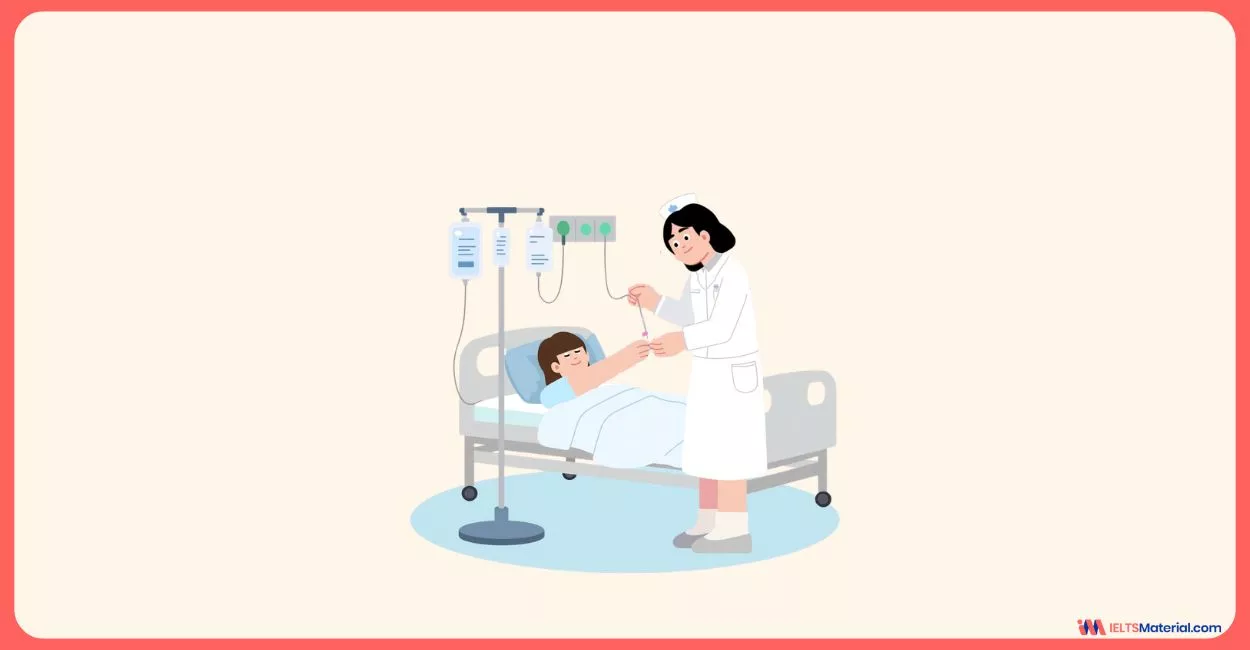
Nehasri Ravishenbagam

Kasturika Samanta
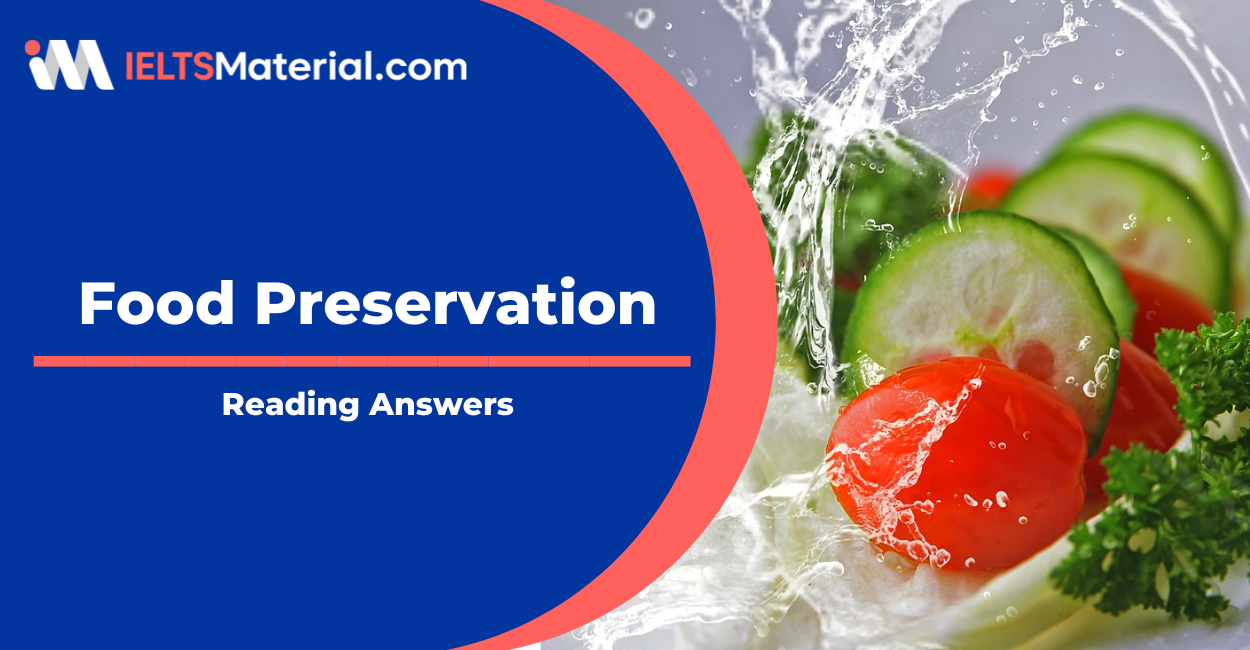
Kasturika Samanta

